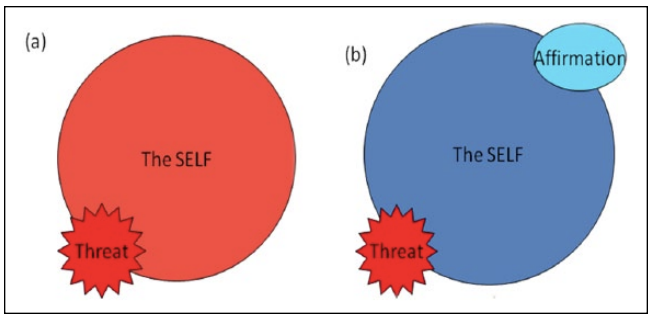What if you could say a few phrases a day and poof, your anxiety was gone? Contrary to popular belief, that is not how affirmations for anxiety, or affirmations in general, work. But affirmations can still make a difference in how much you suffer when anxiety does arise.
The truth is affirmations don’t change our reality. Instead, they expand something known as our self-concept, basically how we see ourselves, and make it easier for us to feel secure about who we are even when something threatens that view.
To get the benefits of affirmations, you need to understand what they are, how they work, and how to use them. That is exactly what we will cover here from science-backed sources – as well as give you fourteen affirmations for anxiety to use on your own.
Here are the sections we will cover:
- What are affirmations?
- What are the benefits of practicing affirmations?
- How do affirmations work?
- Are affirmations beneficial for anxiety?
- How to use affirmations, so they actually work
- Creating your own affirmations
- Examples of affirmations for anxiety
What are affirmations?
Affirmations are also referred to as self-affirmations or positive affirmations. The Psychology Dictionary refers to affirmations as “a brief-phrase which is spoken again and again by a patient in an effort to plant seeds of happy and positive notions, conceptions, and attitudes into one’s psyche.” (12)
To truly understand affirmations, you first need to understand a few terms in the self-affirmation theory, which is the birthplace of affirmations.
- Self-concept: how someone thinks about, evaluates, or perceives themselves (3)
- Self-esteem or self-worth: how much someone likes, accepts, or approves of themselves, or how much they value themselves (3)
- Self-integrity: someone perceives themself as living up to a culturally approved idea of goodness, virtue, and agency (4)
- Self-regard or self-respect: consideration for oneself
Self-affirmation theory takes a look at how people maintain self-integrity when this perception of themselves is threatened. (4) In other words, the theory looks to understand how people adjust to stay feeling “good” or “virtuous” when some message or event challenges that belief. (10)
Generally, when a person’s self-integrity is threatened, they may rationalize, deny, resist, or distort reality. Many studies have shown that people are less likely to be defensive towards threatening information when they practice self-affirmations in an area of self-worth unrelated to the threat. (4)

What are the benefits of practicing affirmations?
After the self-affirmation theory was developed, many people began running clinical trials and researching to better understand what affirmations were helpful for.
Scientists and researchers have suggested that affirmations can:
- Reduce physiological and psychological stress responses (4) and rumination (1)
- Improve problem-solving (7)
- Improve performance on tasks related to executive functioning (7)
Basically, self-affirmations remind people of valuable parts of themselves, allowing them to see threatening events in life in a more rational and reasonable way. (7)
But, like any good argument, there is also a counterview that argues people with low self-concepts and self-esteem are harmed, not helped, by self-affirmations. And it is ruled by yet another theory, the self-verification theory.
The self-verification theory proposes that people want others to see them the way they see themselves. (9) Even when someone’s self-view is negative, it is reassuring and comforting when the negative belief is reaffirmed.
So when positive statements do not align with the preconceived negative self-view, people reject the statements or find them to be false.
One study shows that when people with low self-esteem say positive affirmations they actually end up feeling worse. (9)
This counterargument makes it increasingly important that for affirmations to work they must be rooted in some real, realistic, or accurate belief a person holds about themselves. You can learn more about this in the “How to use affirmations so they actually work” and “Creating your own affirmations” sections.
How do affirmations work?
Self-affirmations work by expanding a person’s working self-concept, so when a threat arises it seems less dangerous and their self-worth is less damaged. (5) In other words, self-affirmations help people have a more secure, broader view of who they are and feel less defensive when that view is challenged.

The model above outlines the difference between how a person responds to a threat to their sense of self when they do not practice self-affirmations (b) versus when they do (c).
Diagram (a) shows that only a small portion of our self-concept is available at one time. When a threat appears for a non-affirmed person (b), they constrict their working self-concept and think excessively about their threatened identity. When a threat appears for a self-affirmed person (c), the expanded self-concept gives more perspective to the threat and the threat doesn’t control the person’s feelings of self-worth. (5)
Are affirmations beneficial for anxiety?
There isn’t much research specifically about the effects of self-affirmations on anxiety. Most studies have found positive results in reducing stress and the brain’s executive function. But that doesn’t mean affirmations can’t be helpful for anxiety.
Stress and anxiety are similar but they are not the same. Stress is usually in response to an external trigger. Whereas anxiety is a persistent and excessive worry even when no stressor is present. (13)
One study that tested whether self affirmations helped reduce social anxiety showed that although social anxiety was reduced in both test groups, the self-affirmed group did not have a bigger reduction than the non-affirmed group. (11)
Although affirmations may not reduce anxiety, they may help people feel more confident to handle anxiety when it does arise.
Affirmations introduce a new and adaptive way to thinking about things, which is a similar goal of cognitive restructuring (or CBT) which is a therapy often used for anxiety. (1)
How to use affirmations so they actually work
A common misconception about affirmations is that they speak things into existence. Affirmations don’t cause change – just like thoughts don’t make things happen or not happen.
What affirmations do is open your subconscious to different possibilities and create opportunities to see yourself and process information in new ways. (7)
Follow these tips to create a helpful affirmation practice:
- Repeat affirmations 3 to 5 times daily
Practice helps to make the affirmation stick. Psychotherapist Ronald Alexander suggests repeating self-affirmations 3 to 5 times a day to reinforce the new positive belief. (1) - Write them in journal or say them in front of the mirror
Ronald also suggests that writing them down in a journal or saying them in front of a mirror can make them stronger and produce more effective results. (1)
If you don’t like journaling, you could also have a “Notes” section on your phone to keep track of your affirmations. - Make your own choice to practice self-affirmations
It is important that your practice self-affirmations only if you choose to, not if you are forced.
One study showed that people who were forced to practice self-affirmations did not find benefits in practice. When participants were given a choice to self-affirm, the benefits were restored. (7)

Creating your own affirmations
The best way to have a powerful affirmation is to create your own that are specific to your beliefs, needs, and experiences. Here are a few things to keep in mind when creating your affirmations, so they are as impactful as possible:
- Set them in the present
Unlike a goal, affirmations are meant to remind you of what is possible right now. (6) By setting affirmations in the present tense, you are reminding yourself of that truth.
To do this, use phrases like “I appreciate” instead of “I will appreciate” OR “I am” versus “I will be.”
- Base your affirmation in reality
For affirmations to work, they need to be based in reality. If they are too far-fetched, your brain will struggle to believe the self-affirmation and potentially disregard it. This is also particularly important for people with anxiety. (8)
In cases with people with low self-esteem, unrealistic affirmations can even make them feel worse about themselves. (9) So, basing an affirmation in reality is key.
For example, instead of something like “I am never going to have another anxiety attack,” say something like “I feel confident that if an anxiety attack comes up, I have the tools to manage it.”
- Put your name in the affirmation
Adding your name in the affirmation can make a stronger connection that you are talking about yourself.
An example of this is using “I, [your name]” at the beginning of each affirmation. (7)
- Add a feeling to make the affirmation stronger
Feeling words are great to use in affirmations to drive home the emotional element of the belief you wish to grow.
Some examples of feelings words are “enjoy,” “appreciate,” and “feel grateful.”
For affirmations for anxiety in specific:
- Embrace anxiety and anxious thoughts
Trying to deny that anxiety exists just makes anxiety worse. Instead of pushing anxiety away or denying its existence, allow it to be part of your affirmation practice.
Embracing whatever comes up lets you know that you can handle challenging situations even when unpleasant thoughts or sensations come into play.

Examples of affirmations for anxiety
According to the self-affirmation theory, self-affirming in a separate domain can help you feel more confident and less threatened in other domains.
What that means for anxiety is if you self-affirm in an unrelated domain – for example, a skill you are proud of or other broad categories like relationships – it can subsequently make you feel less threatened in a separate domain like anxiety.
So it might be worthwhile to use the tips in the “Create your own affirmations” section to build affirmations that support other areas of your life.
Regardless, since you came here for affirmations for anxiety, here are fourteen for you to explore.
- I, [your name], allow feelings of anxiety to arise on their own, and I feel capable of completing the task at hand.
- I, [your name], allow racing thoughts to pass on their own, and I feel relief.
- I, [your name], am capable of handling overwhelming situations, and I feel strong.
- I, [your name], can take a break when anxiety pressures me to do more, and I feel self-love.
- I, [your name], allow intrusive thoughts to come and go on their own, and I feel relaxed.
- I, [your name], can support myself when my anxiety levels are high, and I move forward positively.
- I, [your name], allow uncertainty when I don’t know the answer, and I feel free to move forward without knowing.
- I, [your name], allow uncertainty when there is no answer, and I move forward without knowing.
- I, [your name], allow feelings of stress in my body, and I feel less suffering.
- I, [your name], allow unpleasant sensations to arise, and I feel connected to my body.
- I, [your name], am capable of handling fear, and I feel strong.
- I, [your name], support myself when anxiety enters my body and mind, and I feel self-love.
- I, [your name], can do hard things even when anxiety is present, and I feel capable.
Sources
- https://positivepsychology.com/daily-affirmations/
- https://sites.lsa.umich.edu/sasi/wp-content/uploads/sites/275/2015/11/Critcher_AffPersp.pdf
- https://www.simplypsychology.org/self-concept.html
- http://psychology.iresearchnet.com/social-psychology/social-psychology-theories/self-affirmation-theory/#:~:text=Self%2DAffirmation%20Theory%20Definition&text=Having%20self%2Dintegrity%20means%20that,of%20the%20self%20is%20threatened.
- https://sites.lsa.umich.edu/sasi/wp-content/uploads/sites/275/2015/11/Critcher_AffPersp.pdf
- https://www.healthline.com/health/mental-health/do-affirmations-work#making-them-effective
- https://www.psychologytoday.com/us/blog/embodied-wellness/201704/affirm-or-not-affirm
- https://www.healthline.com/health/mental-health/affirmations-for-anxiety#expectations
- https://www.psychologytoday.com/us/blog/the-guest-room/200911/the-danger-self-affirmation
- https://en.wikipedia.org/wiki/Self-affirmation#:~:text=Threats%20against%20a%20person’s%20self,positive%20global%20image%20of%20themselves
- https://pubmed.ncbi.nlm.nih.gov/32223442/
- https://psychologydictionary.org/affirmation/
- https://www.apa.org/topics/stress/anxiety-difference



